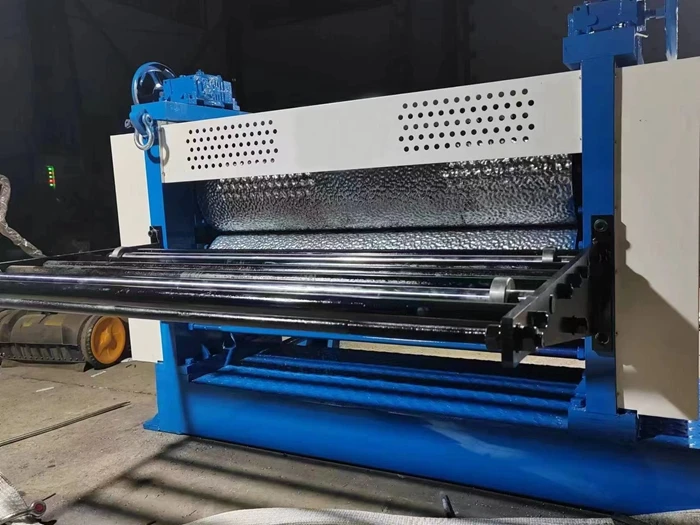roof tile forming machine
The Innovation of Roof Tile Forming Machines Revolutionizing Construction
In the construction industry, the roof is one of the most critical components of a building. Traditionally, roofing materials have varied widely, but concrete and clay tiles have remained popular due to their durability, aesthetic appeal, and ability to withstand harsh weather conditions. To meet the growing demand for roofing materials, the roof tile forming machine has emerged as a revolutionary piece of machinery, streamlining the production of roof tiles and enhancing overall efficiency in construction projects.
Understanding Roof Tile Forming Machines
A roof tile forming machine is specialized equipment designed to produce various shapes and sizes of roof tiles from raw materials. These machines typically utilize a process called roll forming, where metal sheets or other materials are shaped into tiles through a series of rollers. This technology has evolved significantly with advancements in automation, enabling manufacturers to produce high volumes of consistently high-quality roof tiles.
The process begins with the feeding of raw materials into the machine. The materials can vary, with options such as metal, concrete, or clay, depending on the desired tile type. Once fed into the machine, the materials go through a series of rollers, where they are shaped, cut, and sometimes even treated with protective coatings to enhance durability. The result is a finished product ready for installation, allowing manufacturers to provide a steady supply to meet market demands.
Efficiency and Customization
One of the primary advantages of roof tile forming machines is their efficiency. These machines can produce thousands of tiles in a fraction of the time it would take for manual production. This efficiency not only reduces labor costs but also minimizes waste, making the production process more environmentally friendly. Additionally, modern machines are often equipped with advanced technologies, such as computerized controls and automation, which further enhance productivity and reduce the likelihood of errors.
roof tile forming machine

Customization is another significant benefit of these machines. Depending on market trends and consumer preferences, manufacturers can easily adjust the machine settings to produce tiles of different styles, colors, and finishes. This flexibility allows them to meet specific demands and stay competitive in a diverse market. For instance, if wood-like tiles are trending, manufacturers can quickly switch production to create tiles that mimic the appearance of wood while benefiting from the durability of metal or concrete.
Economic Implications
The introduction of roof tile forming machines has considerable implications for the economy. The capacity to produce high-quality roofing materials at a lower cost empowers manufacturers, allowing them to pass on savings to consumers. As a result, more affordable roofing materials become accessible, encouraging construction and renovation projects. This increase in activity can stimulate local economies, create jobs, and ultimately lead to enhanced infrastructure development.
Moreover, as the construction industry continues to grow, so does the demand for roofing materials. The roof tile forming machine plays a vital role in meeting this demand, ensuring a steady supply of products that adhere to modern building standards. This reliability can be especially crucial in regions experiencing rapid urbanization and economic growth, where the need for housing and commercial space is high.
Challenges and Future Directions
Despite their many advantages, roof tile forming machines are not without challenges. The initial investment costs can be significant, and smaller manufacturers may struggle to afford such technology. However, as competition increases and technology advances, prices are expected to become more accessible. Additionally, ongoing research and development in this field may lead to even more efficient machines with capabilities such as smart technology and enhanced sustainability features.
In conclusion, the roof tile forming machine represents a significant advancement in the construction industry, providing an efficient, customizable, and cost-effective solution for producing quality roofing materials. Its ability to adapt to market demands while contributing to economic growth makes it an invaluable asset. As the industry continues to evolve, these machines will play a crucial role in shaping the future of roofing solutions, ensuring that buildings worldwide are equipped with durable and aesthetically pleasing roofs. The ongoing innovation in this space promises a bright future for both manufacturers and consumers alike.
-
Top Drywall Profile Machine Models for SaleNewsJun.05, 2025
-
The Role of Purlin Machine in Modern Structural BuildingNewsJun.05, 2025
-
The Advantages of Investing in a Metal Roof Sheet Making MachineNewsJun.05, 2025
-
Key Features of Hydraulic Bending MachineNewsJun.05, 2025
-
Innovations in Standing Seam Metal Roof Machine TechnologyNewsJun.05, 2025
-
High - Performance Roof Panel Machine for SaleNewsJun.05, 2025
-
Key Features to Look for in a Roof and Wall Panel MachineNewsMay.23, 2025








